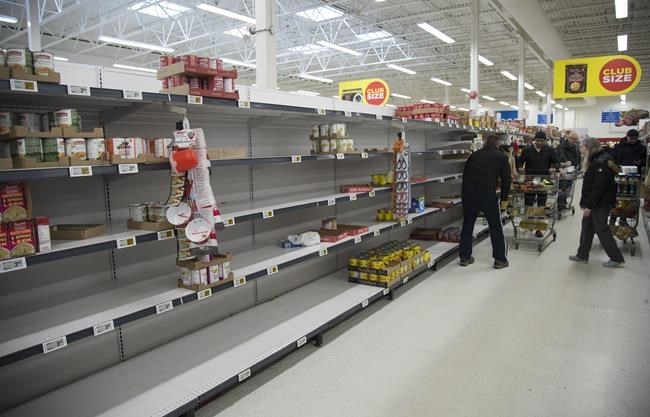OTTAWA — Consumers continued to buy more hand sanitizer, toilet paper, canned goods and baking supplies in April than before the COVID-19 pandemic even as the mid-March shopping frenzy started to die down, according to Statistic Canada's latest data.
Retail grocery store sales jumped 40 per cent for the week ending March 21 compared to the same week last year, the agency said in a special report on how shopping patterns have changed since Canada stepped up its COVID-19 public health campaigns.
The week prior, sales soared 46 per cent. That week included the introduction of a government advisory against non-essential travel.
The StatCan report, the second since the onset of the pandemic, covers a period from the week ending March 21 to the week ending April 11.
The March surge came as Canadians re-stocked depleted pantries and prepared to shop less frequently, among other reasons.
Eighty-three per cent of consumers in Canada are limiting the number of times they shop, according to a new survey by Accenture, a global professional services company. Accenture commissioned the survey of 3,074 consumers in 15 markets, including Canada, and it was conducted between April 2 and 6.
Across the 15 markets, 39 per cent of respondents agreed they're likely to continue doing fewer shops after the pandemic subsides and 26 per cent saying they're likely to continue doing larger shops.
The sales increase slowed the last week of March and first week of April, according to Statistics Canada, with 12 per cent jumps compared to the same weeks in 2019, while the week ending April 11 saw a 19 per cent rise.
The slowdown mimics trends seen by Canada's largest grocers.
Empire Co. Ltd., the parent company of Safeway and Sobeys, said it saw "sales intensity began to subside" by March 22, in an update released mid-April. It continued to see heightened demand for canned goods, baking supplies, and cleaning and sanitization products, it said, while fuel sales dropped as Canadians drove less.
Metro Inc. also saw sales level off after an initial surge, the company said during its most recent quarterly financial release late last month. Between March 15 and April 11, the company saw same-store food sales, a key retail metric, rise 25 per cent compared to the same time last year.
The sales have levelled off since the first week of the company's third quarter, which began March 15.
Loblaw Companies Ltd., meanwhile, saw grocery store sales grow about 44 per cent during the two weeks ended March 21, the company said during its quarterly release April 29. During the first five weeks of the retailer's second quarter, which started March 22, food sales grew about 10 per cent.
Sales of health and personal care items slowed after the March surge, Statistics Canada said.
In the first week of March, for example, hand sanitizer sales increased by 792 per cent compared to the same week of 2019. By the week of April 11, hand sanitizer sales were up 345 per cent.
Soap, and mask and glove sales remained high in the week ending April 11 with 68 per cent and 114 per cent jumps respectively.
Bathroom tissue sales moderated, but were still 81 per cent higher that week.
Purchases of shelf-stable products moved closer to pre-pandemic levels, according to the agency.
For the week ending April 11, rice sales rose 12 per cent while canned goods rose 47 per cent and pasta jumped 49 per cent. In contrast, infant formula sales fell 15 per cent.
People continued to buy baking supplies amid ongoing efforts to remain at home.
In the second and third week of March, flour sales increased 208 and 207 per cent respectively.
By the week ended April 11, that had slowed to an 81-per-cent increase. Butter and margarine sales rose 18 per cent, milk was up 21 per cent and eggs jumped 44 per cent.
Sales for Easter-related products remained similar to trends seen in 2019, with the exception of flowers.
At grocery stores, flower sales fell 47 per cent in the week leading up to Easter compared with the same week the previous year.
With the closure of many bars and restaurants, as well as authorities encouraging people to stay home as much as possible, Statistics Canada noted alcohol and coffee sales for at-home consumption increased.
In the week ending April 11, alcohol sales were up 46 per cent, while coffee filters saw a 68 per cent rise.
Hair dye sales jumped 75 per cent that week, but cosmetic products fell 33 per cent.
This report by The Canadian Press was first published May 11, 2020.
The Canadian Press
Note to readers: This is a corrected story. An earlier version incorrectly identified the date of Easter.




